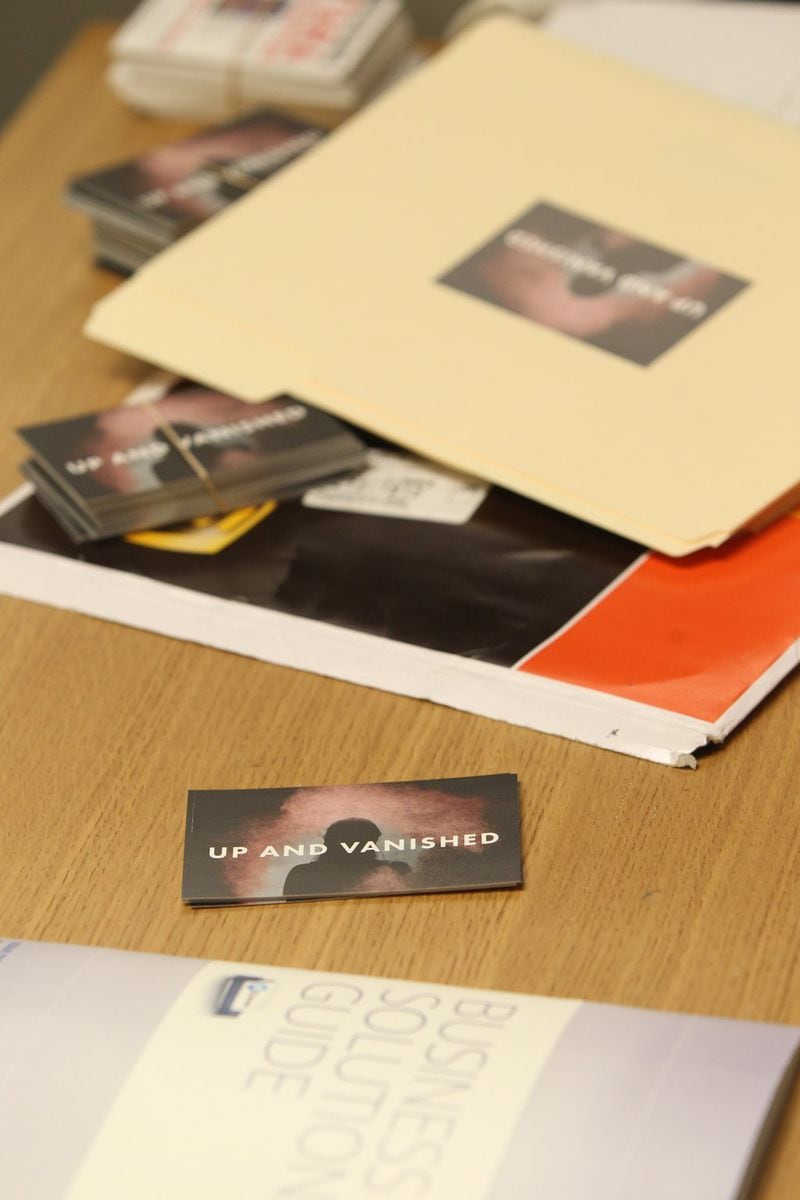For years the disappearance of Ocilla school teacher Tara Grinstead was the coldest of cold cases.
Grinstead had not been seen since she left a cookout Oct. 22, 2005 and despite years of investigating, law enforcement had yet to make an arrest.
It was just the project Atlanta-based documentary filmmaker Payne Lindsey had been looking for when he stumbled across the former beauty queen's name on a list of unsolved cases on the Georgia Bureau of Investigation website.
His digging into the case resulted in the hit podcast "Up and Vanished," a whodunit series that has reached as high as No. 2 on the iTunes charts as millions worldwide have tuned in to hear Lindsey try to put the pieces of the puzzle together.
Even before the first episode, Lindsey, admittedly a novice investigator, pored over the internet for any information he could find.
“I was relying on old news articles and different statements made by people,” said Lindsey, 29. “I read it all.”
Well, not “all.”
The mother lode of information on the Grinstead case resides in the official criminal investigation file, a file Lindsey had been told was the largest ever assembled by the GBI. Lindsey said a GBI source told him that the file boxes stretched 16 feet in length.
So Lindsey asked to see it, filing an open records request with the bureau. He immediately ran into one of the iron-clad exemptions in the Georgia Open Records Act: Police records “in any pending investigation” are closed.
“I did submit a records request with the GBI. I knew it was going to be denied but I had to at least try,” he said. “My reasoning was how can you claim this is an open investigation?”
It’s a reasonable question.
Hollie Manheimer, executive director of the Georgia First Amendment Foundation, is preparing to step down from that position after more than two decades of trying to make Georgia government more open. The pending investigation exemption is something of a white whale in her career. It’s way too broad, but she’s not been able to get any traction on limiting police discretion, she said.
“It is unbelievable to me that investigations could be open forever,” she said. “Right now, when you say that an investigation is pending, everything is shut down except incident reports. It’s troubling.”
Should entire case be closed?
The pending investigation exemption comes up again and again in episodes of “Up and Vanished.” That case file certainly has answers to some questions Lindsey and his army of amateur sleuths wanted to know.
Without it, many “Up and Vanished” episodes involve Lindsey chasing what he calls his “white rabbits.” Grinstead’s love life, a mysterious “grave” under abandoned house, rumored cover ups by local police — Lindsey examined everything, often ending with no firm conclusion.
For example, a latex glove found at Grinstead’s house after her disappearance comes up again and again. Was it blue or yellow? When was it entered into evidence? Whose DNA was it checked against? Lindsey can’t be sure, but he is pretty sure it’s in the GBI file.
Lindsey said “Up and Vanished” would have been “way different” if he had that file.
“We would’ve cleared people sooner,” he said. “That, to me, is the biggest shame.”
Lindsey’s podcast is, as he put it, a “real time” investigation, meaning listeners might spend an hour tagging along with Lindsey as he looked deeply into a suspect’s whereabouts the night of Grinstead’s disappearance. But that’s a real person who may have nothing to do with the case whose name is suddenly ringing in the ears of people all around the country.
In an episode in late January, Lindsey talked about the pending investigation exemption in state law with former Headline News host and current true crime podcaster Nancy Grace. Like Lindsey, Grace, a former prosecutor, delved into the Grinstead disappearance time and again on her show and Lindsey wanted her take on the secret file.
“I think that we have closed investigative files for a reason,” Grace said. “However, once a case goes cold and police aren’t getting answers I really don’t see why the entire case file is kept secret.”
Grace’s stance on the topic shows the delicate nature of criminal investigative files. For instance, she thinks documents showing the elimination of suspects should be closed.
“You don’t want that released because that person is innocent and they would be forever smeared by that association with a murder,” she said.
But under current law, that kind of information would be available once a case is closed, so why not release it in cold cases like Grinstead?
Regardless, Grace said the “bulk of the investigative material,” including analysis of physical evidence, should be released, she said. There’s no good reason to keep it secret, she said.
“We’re not getting any more forensic evidence. That’s over,” she said.
Police have final say, under Ga. law
This release-some-keep-some approach to investigative documents is complicated. Who determines when something should remain closed?
Right now the police have the first and final say on when an investigation is pending, thanks in part to a Georgia Supreme Court opinion some find troubling.
The opinion came as the result of a public records lawsuit filed a decade ago by the Athens Banner-Herald against the Athens-Clark County government over the investigation into the death of a University of Georgia student 16 years prior that police claimed was still “pending.”
The high court agreed, handing down a strong victory to police as the sole arbiter over when to throw in the towel.
"This exemption allows the law enforcement agency, not the courts, to determine what information, if any, is essential to solve a case," Justice George Carley wrote for the majority.
It also allows police to cover their backsides by throwing a blanket over every unsolved case. At least it does until some smart aleck like Lindsey comes along and throws a bunch of sand in the air.
Podcaster hopes to see file, one day
Late last month the GBI called a hastily arranged press conference to announce they had arrested Ryan Duke, a former student of Grinstead, and charged him with her murder. The information on Duke came in as a new tip. He had never been a suspect and his name likely does not appear in that 16 feet of case file.
Lindsey sees the irony. Duke’s arrest only makes his argument stronger that the GBI had nothing to risk by releasing those documents.
“It’s a pristine investigative file filled with nothing about Ryan Duke,” he said.
A second suspect has since been arrestedwho also appears to be a new figure in the case. To their credit, the GBI has said media attention kept the case alive and, while not mentioning "Up and Vanished" by name, Lindsey has taken a few victory laps in his podcast.
Not every state is as closed with its investigative documents as Georgia. Some states’ laws consider case files open unless police can demonstrate a compelling need to keep them closed. While investigative files in those states often remain closed, the law at least compels some sort of review.
The cleanest fix for Georgia’s over-broad exemption on pending cases would be to add an appeal. A judge could hear both sides, look at the file and determine whether to release all, some or none of the documents, balancing the compelling needs of justice and government transparency. In most cases, judges likely would favor keeping the files secret while police seek a suspect, but in cases like the Grinstead disappearance releasing the file might make more sense.
Meanwhile, Lindsey is preparing for trial coverage. The state's major media outlets are fighting a broad gag order imposed by Superior Court Judge Melanie Cross forbidding investigators from releasing even the most basic information about why Duke or his alleged accomplice, Bo Dukes, are suspects. The GBI declined to comment for this column, citing the gag order.
If the arrests stand up and Duke and Dukes are convicted, Lindsey is looking forward to peering inside the case file, if police deem it officially closed.
“It would just be nice to know,” he said.










